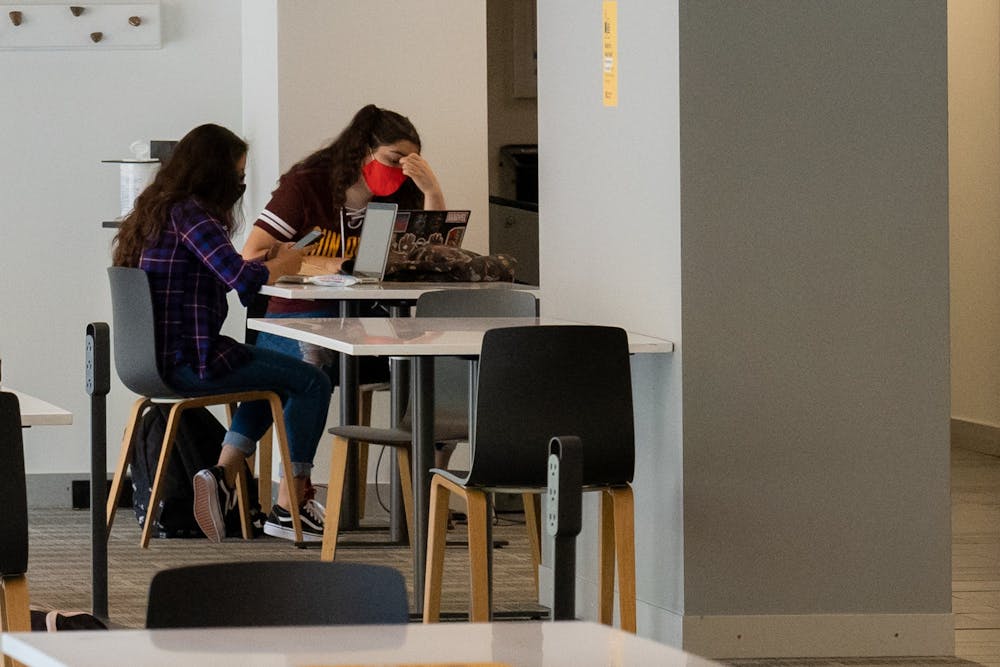Days look the same for most ASU students: Wake up, open a laptop, eat something. Most rarely go out, staying indoors for safety and attending classes remotely despite an in-person option.
Students have handled a stressful combination of new routines, new learning environments and interactions on a screen within a schedule that provides few University-approved breaks.
They're tired and left with little relief on the horizon.
Lauren Dwyer, a graduate student in user experience, said she's "not 100% burned out yet — knocking on wood.
"It's just one week after the other," Dwyer said. "There's really no way to catch a breath."
With no fall break, classroom struggles have been amplified
Dwyer said her instructors did not adjust curriculum or deadlines to accommodate the University's decision to cancel fall break, which would have taken place from Oct. 12-13.
Since Aug. 20, Monday through Friday, students have attended school with no breaks since Labor Day. The next break is Veteran's Day on Nov. 11. Those two days, combined with Thanksgiving break, will give students a total of four University-approved days off this semester.
Jenny Brian, a senior lecturer at Barrett, The Honors College, said "my students are struggling, they are Zoom fatigued, they're overwhelmed with the amount of work that they have to do and they really needed a break."
Students have made the most of this semester, but without a chance to "decompress," the situation has been challenging, Dwyer and several other students said.
Evan Desai, a graduate student in mass communication, said it is clear his professors worked to make changes quickly this semester and have been flexible with him and his classmates, but the classes are not the same.
"I try to go to class as much as I can but it's not even a classroom experience," Desai said. "It's really hard to get the attention you need. The pandemic has already made things harder, and ASU Sync is not working."
Dwyer said discussing class material "is much easier" when students are in the same space. She said her classmates attended class on Zoom and in person, breaking down the interaction between her and her peers.
"I talk to more people, but the connections aren't as deep," she said.
Desai said all of his classes are offered through ASU Sync besides a few internships. He said the majority of students in his classes opt to Zoom. Those still showing up in person aren't just there as students anymore but now often assist the professor in setting up Zoom and solving any technological problems that may arise.
Students are looking for ways to not overstress
Students feeling stressed should take advantage of ASU's Counseling Services, Frederick Corey, vice provost of undergraduate education, said. A University spokesperson said ASU has 40 professional counselors, psychologists and social workers, along with a dozen interns.
The spokesperson said the rate of calls counseling services receives remains in the low hundreds per day, which is comparable to previous years.
Already having completed an undergraduate degree at ASU, Desai said he's aware of mental health and tutoring options. He said every time Sunny, a University-specific text bot, messages him to check-in, he always says he's struggling but never gets a follow-up or phone call from a real human.
"It is a profound lack of care to shorten a semester (and) to make the semester kind of higher stress," said Brian, who is a member of the Community of Care Coalition. "It feels deeply unfair to students."
Derek Berglund, a sophomore studying mechanical engineering, said the cancellation of fall break caused stress he wasn't prepared for. He said he had four midterm exams in a row and was dragging through the week of classes where fall break was supposed to be, missing critical content he's still catching up on.
Dwyer said she makes sure to give herself mental breaks after classes. She has "learned to cut some of her losses" to avoid burn out by not working late at night. Instead, she finishes her work the next day.
Finals week is 'going to be a disaster no matter what'
When finals week was rescheduled and the University announced it would hold only virtual instruction after Thanksgiving, Desai said he understood the change from a health standpoint but not from an educational standpoint.
"I get that they wanted to move everything online after Thanksgiving," Berglund said. "But I don't really understand how that justifies just moving up finals week."
Corey said if students have multiple finals scheduled on one day, they should speak to their professors about an alternative: Taking the exam with another section or doing a take-home test. If that does not work, students should contact the Dean's office.
Berglund is still unsure when his final labs and tests will be. He said one of his professors scheduled a final test already and communicated with the class they would not be flexible on the date or time.
"I just really wish finals week was normal," Berglund said. "I have dread for that week coming up. Finals week is always stressful but given how they used to do it ... compared to now, I'm really not looking forward to that.
"It's going to be a disaster no matter what," Berglund said.
Desai said he's trying his best given the circumstances and changes to a semester that is already about half-way through.
"I don't think (my grades) have gotten better, but they haven't necessarily gotten worse," Desai said. "Just learning in this environment is harder."
Reach the reporters at pjhanse1@asu.edu and wmyskow@asu.edu and follow @piperjhansen and @wmyskow on Twitter.
Like The State Press on Facebook and follow @statepress on Twitter.

Wyatt Myskow is the project manager at The State Press, where he oversees enterprise stories for the publication. He also works at The Arizona Republic, where he covers the cities of Peoria and Surprise.

Piper Hansen is the digital editor-in-chief at The State Press, overseeing all digital content. Joining SP in Spring 2020, she has covered student government, housing and COVID-19. She has previously written about state politics for The Arizona Republic and the Arizona Capitol Times and covers social justice for Cronkite News.




